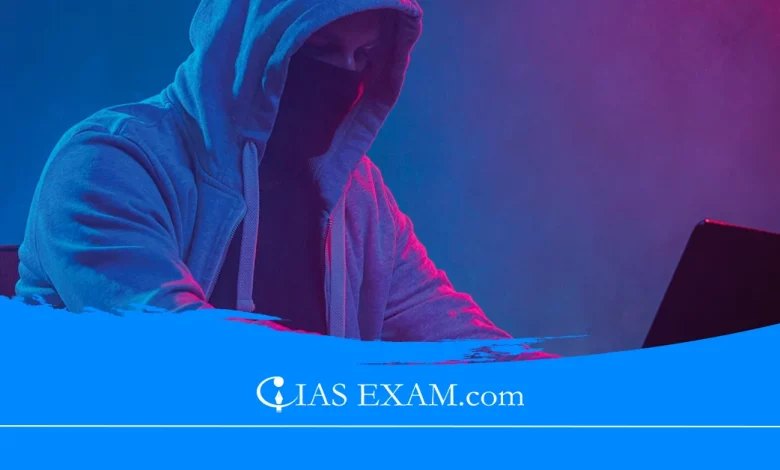
Context
A new type of cybercrime called “digital arrest” scams is on the rise, in which criminals pretend to be law enforcement officers in order to trick people into thinking they are about to be arrested for made-up legal offences.
Details on Digital arrest
- Digital Arrest represents a novel and sophisticated form of cybercrime that has recently gained prominence.
- It involves criminals impersonating law enforcement officers to defraud victims through digital communication channels.
- This cybercrime trend has raised significant concerns due to its deceptive nature and the psychological impact on victims.
Understanding the Digital Arrest
- Techniques Used: Scammers initiate contact typically over a phone call, claiming to be police officers. The conversation is often steered to a video call, frequently on platforms like Skype, where the illusion of a police interrogation is created.
- Elaborate Setups: These fraudsters may create fake backgrounds resembling police stations and wear uniforms to enhance their credibility.
- Psychological Manipulation: The victim is usually accused of a non-existent crime, and the situation is portrayed as urgent and severe. This fear tactic is a crucial component of the scam.
Notable Incidents
- Case Studies: A case in Noida involved a woman who lost over Rs 11 lakh. She was falsely implicated in criminal activities, interrogated over a Skype call, and coerced into transferring money.
- Rising Incidents: Such cases are becoming more frequent, indicating a troubling trend in cybercrime tactics.
Impact on Victims
- Financial Losses: Victims are pressured to transfer large sums of money under the pretext of legal fees or bail payments.
- Emotional Distress: The experience of being falsely accused and the realism of the digital interrogation can cause significant psychological stress.
Legal Framework and Law Enforcement Response
- Legal Provisions: The cases Digital Arrest, as per reckon for Information Technology Act and Indian Penal Code, are pursued.
- Police Action and FIRs: Crime agencies have registered An FIR, and the investigation is in progress of these scams. In the Noida case the police authority filed an FIR and the responsible department took over the cybercrime.
Preventive Measures and Public Awareness
- Awareness Campaigns: It is a common theme now among authorities and cyber security experts to highlight the importance of vigilance and care when communicating online.
- Safety Tips: The public must prove the police action is correct, request a parole document issued by the authorities and make sure if it raises suspicions, visit a police station and get their case confirmed.
Way Forward
- Enhancing Public Awareness: It is important to educate the public with regards to the non-existent nature of digital custodies in a clear and concise way. This can be addressed through campaigns of mass information with the participation of media,social networks and outreach civic organisations.
- Strengthening Legal Frameworks: The jurisprudence ought to develop with off themselves causing technological crimes. Through this, laws will need to be updated and introduced to even punish the offence more.
- Improving Cybersecurity Infrastructure: Shielding financial and communication systems from attacks using robust cybersecurity systems to detect and act against any fraudulent activities is key to eliminating suspicious behaviour. In addition to it, a close collaboration between banks, internet and mobile providers, and law enforcement departments should be organised.
- Effective Law Enforcement Training: Teaching law enforcement personnel about current cyber crimes as well as the most up-to-date digital investigation techniques is indeed vital. Indeed, thanks to this, the monitoring, investigation, and the culprits can be easily done.
- International Cooperation: Arrest Scams , which mostly are transnational in nature, are one of the earliest scams ever done by cybercriminals. The critical role of global coalition on knowledge pooling, legal help, and coordinated actions among cybersecurity actors is pivotal.
Conclusion
The phenomenon of Digital Arrest underscores the complexities of the digital world we inhabit. It is a stark reminder of the need for constant vigilance and cybersecurity awareness. As we become increasingly reliant on digital communication, understanding and recognizing the signs of such cyber frauds become imperative. Public education and a collaborative approach between law enforcement, cybersecurity experts, and the community are key to combating this evolving threat.
Source: The Hindu
UPSC Mains Practice Question
Q.What are the implications of the emerging trend of ‘Digital Arrest’ scams in the context of personal cybersecurity? Evaluate the measures that individuals can take to protect themselves against such scams, and discuss the role of cybersecurity education in preventing these fraudulent activities.





.png)



